Yuri Dzhibladze and Zakharova: Torture of participants of post-election protests have not been investigated
7- 3.06.2015, 10:58
- 13,679
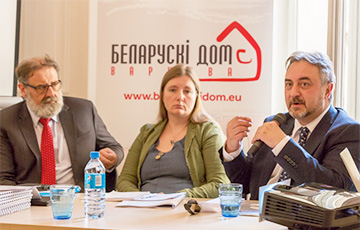
Russian human rights defenders have prepared a report on the situation in Belarus.
The report was presented by authors Yuri Dzhibladze from the Centre for the Development of Human Rights and Olga Zakharova from Freedom Files in the Belarusian House in Warsaw on June 2. The presentation was moderated by Krzysztof Stanowski, the head of Solidarity Find PL.
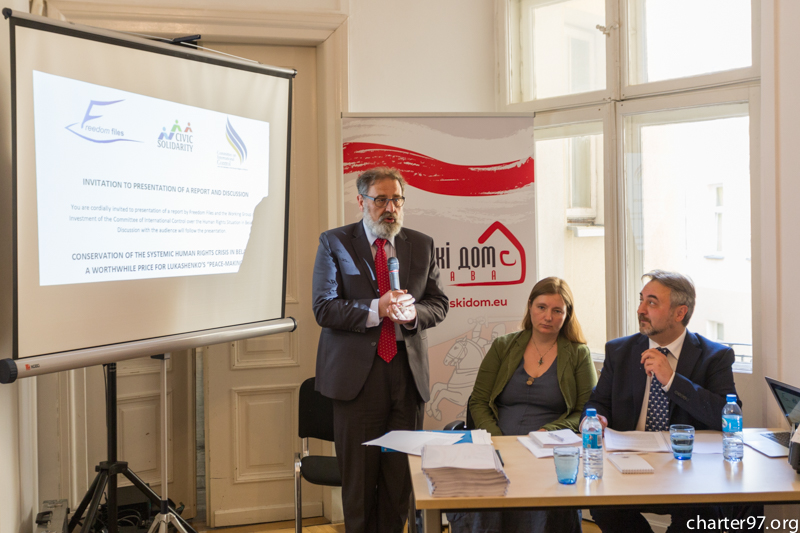
Yuri Dzhibladze summarised the results of four years passed since the dispersal of the rally in Minsk on December 19, 2010.
“The new so called presidential elections will be held in Belarus in a few months,” Yuri Dzhibladze noted. “It gives us an opportunity to look at what has happened for the last four and a half years since 19 December 2010, assess how effective or not effective the actions by the European Union and the international community towards Belarus were and form recommendations for further actions.
The situation of human rights and freedoms remains consistently bad and even continues to deteriorate. The system problems that existed before 2010 didn't disappear, unfortunately. The events on the Square and some months after the protests – beating of demonstrators, mass arbitrary detentions, politically-motivated trials against more than 40 people, tortures of protesters – have not been investigated so far. The rights of those released are still infringed, and those guilty of torture and unfair verdicts have not been punished.
A number of repressive laws were adopted. They restricted freedom of speech, freedom of assembly and association, gave more opportunities for re-enforcement bodies and security agencies to use force. We see the increase in repression since spring 2014, in particular targeted pressure on journalists, arbitrary detentions of tens of journalists, their prosecution for cooperation with foreign and Belarusian mass media in exile, systematic blocking of websites and bans on using anonimisers. The Belarusians are isolated from independent media, which is especially important in connection with the war, Russia, its aggressive policy and propaganda. They remain alone before the flow of poisonous propaganda.”
Yuri Dzhibladze stressed the events of the last 4.5 years allow the international community to describe the human rights situation in Belarus as a systemic crisis.
“It is very important for the UN, OSCE and other international organisations to keep an eye on the situation in Belarus and assess it correctly,” he said. “It may seem there's no sense in adopting the same resolutions and listening to the same rapporteurs every year if there are no improvements. But we think such assessments, resolutions and reports at least help European states, the EU in general and a broader international community form their policy towards Belarus.
We mustn't allow Lukashenka to reduce cooperation only to the problem of political prisoners. This is his traditional hostage game that he successfully played many times. We must begin with it [political prisoners], these are basic demands. But if we reduce our actions only to it, Lukashenka will release them in exchange for lifting sanctions and resuming economic relations, but he will arrest and convict a new group of hostages when time comes, may it be elections or something else. The cycle will repeat again and again.
It is important that the EU, unfortunately, bought into Lukashenka's positioning himself as an important participant of the peaceful process due to the war in Ukraine and Russia's aggressive policy. It resulted in lifting a part of sanctions. This is a huge problem, because the EU not only failed to solve the problems that appeared in 2011-2012, but also chose a reverse course.
It's no doubt that such a policy is a mistake. The EU expects Lukashenka to criticise Russia, support Ukraine's sovereignty and speak against the annexation of Crimea. What is the main thing in the eyes of the EU is that he allegedly guarantees the sovereignty of Belarus from possible control and possible aggression from Russia. This is a mistake, because he cannot really do it. He is bluffing, and does it successfully. As a result, the EU will see neither respect for human rights nor prospects for changes in the country and protection of Belarus from Russia's possible aggression.
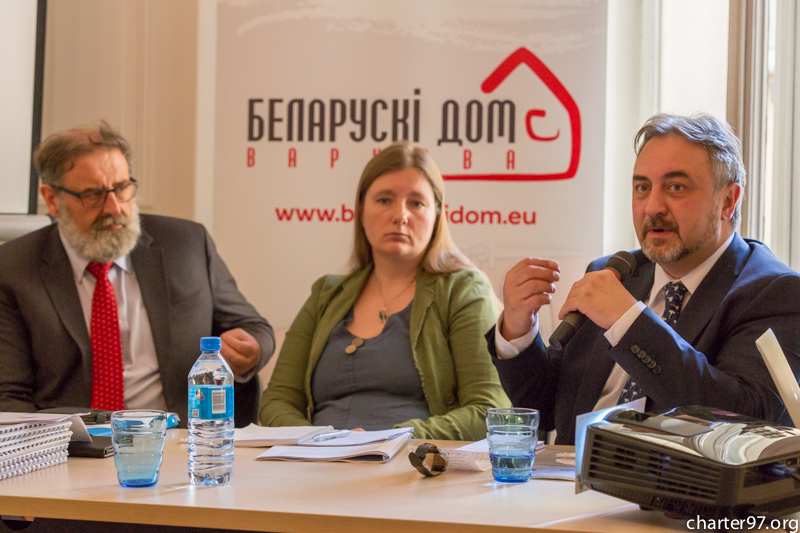
According to Yuri Dzhibladze, Belarus may lose its sovereignty within two or three years on the “Crimean scenario”.
“Russian propaganda has unprecedented influence” he noted. “It is important to understand that the target of propaganda is both Russian society and the population of all countries of the region, all who understand Russian and watch Russian television. Lukashenka completely suppressed freedom of speech, nearly suppressed civil society, opportunities for a public discussion in the country tend to zero, though these are not the instruments and institutions that would be able to confront Russian propaganda. Active civil society, independent media, the Internet, offline and online discussions – all this is practically suppressed.
Lukashenka cannot switch off Russian television for political reasons, so Belarusian society is being bombed daily by Russian propaganda, which, unfortunately, works both in Russia and in the whole region, including Belarus. With Russian troops already in Belarus and massive propaganda that became a powerful weapon in a hybrid war, various groups of pro-Russian activists feel free to do whatever they want in Belarus. As a result, if these developments continue, if propaganda continues to be poured on Belarusian citizens, a considerable part of the Belarusians will want to become a part the “Russian world” in two or three years. It will cost Putin less then sending troops.
The current situation in Russia is so that logic of the development of the aggressive imperial regime requires maintaining the atmosphere of hostility, confrontation, looking for enemies always and everywhere. They cannot reduce the level of propaganda and mobilisation of society against enemies of all sorts, but they need to demonstrate any success. The annexation of Crimea was the enormous success. It was bloodless, it answered some psychological and cultural aspirations of a part of society and was represented as Putin's great victory.
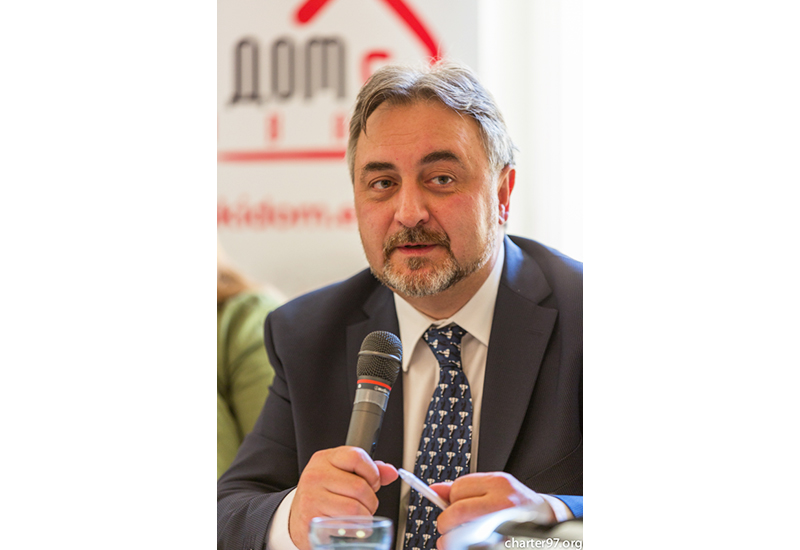
The situation in eastern Ukraine is something different. It costs much. People receive coffins and information about the events there despite all attempts to hush up information and punish those spreading facts about the involvement of Russia and Russian solders in the conflict. The price of this war is much higher than the Kremlin expected. So, Putin cannot send troops to Belarus, the Baltic States, northern Kazakhstan or Transnistria for economic reasons – the price is high both economically and politically. So, such hybrid methods of the aggressive expansion of his control and influence are an effective tool. He cannot stop the expansion, because it is the logic of his regime. It turns out that Belarus is really one of the most probable targets of the Kremlin's expansionist aspirations.”
Olga Zakharova criticised the policy of the European Union in relation to dictatorial Belarus.
“We studied two things in our report,” she said. “The first part is about human rights in Belarus, about how the situation has worsened for the last 50 months. The second part is about the EU's policy towards your country.
Brussels says the war in Ukraine influences the rapprochement with Minsk, but Europe would like to use a different approach even if the war hadn't happened. 'We think our policy of sanctions doesn't work, it was a mistake,' they say. We have a simple answer to it. If you look at the sanctions and their influence on Lukashenka's policy, you'll see that when the European Union made really serious steps and imposed economic restrictions, Lukashenka always released someone immediately. The first big release was in autumn 2011, after the first sanctions were imposed on the regime's main friend Vladimir Peftiev, who, as we know, was not only a banker of the regime but also a trustee and operator of the regime. The second part of political prisoners was released in late September, when the US warned about new sanctions. Andrei Sannikov and Zmitser Bandaranka were freed after some of Yuri Chizh and Anatoly Ternavsky's companies were put on the blacklist.”
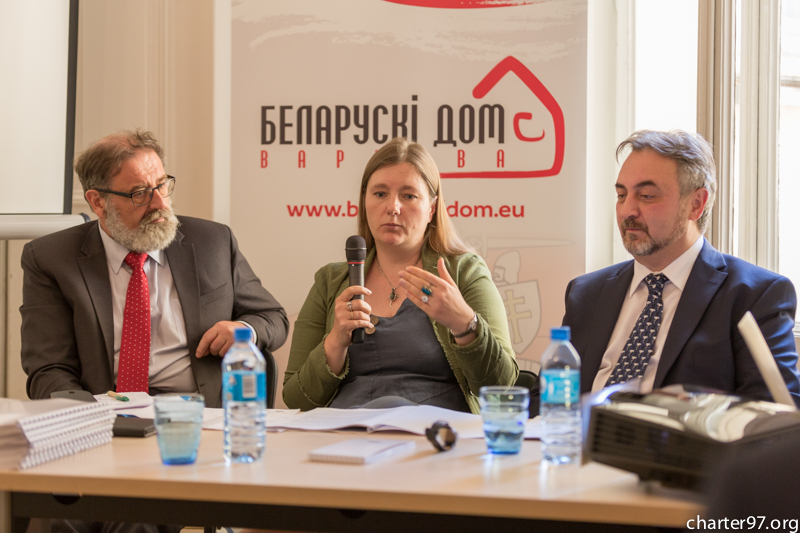
Olga Zakharova noted that the process of releasing political prisoners jailed for the post-election protests was stopped in 2012. She explained why it happened.
“The release of political prisoners was slowed down as soon as Brussels believed that 'all will be released during the amnesty in the summer'. They saw the so called positive signals, as the EU likes to say. What surprises me most is the term positive signals,” she said. “Either we have results or not. There are clear criteria: either we have political prisoners or not; either legislation is changed or not. The rest is just talks on the sidelines. Kupchyna and Makei can promise the moon. They are selling fear now. They say if political prisoners are released, Putin will be displeased. If Mikalai Statkevich is freed, he will allegedly destabilise the situation ahead of the elections. The EU is ready to buy into it. But how can Brussels believe in Lukashenka's statements about guarantees of not attacking Ukraine by Russia from Belarus if even political prisoners cannot be released without Putin's consent? It is obvious that it is ordinary demagogy, but the very logic of the EU is wrong.
European officials claim they don't normalise relations with Belarus. Perhaps, they mean that Minsk, as well as Turkmenistan, doesn't have a partner agreement. But the same officials say they will not object European banks buying Belarusian bonds worth a billion dollars. Lukashenka doesn't need another normalisation. It's enough for him to have constant 'dialogues' without results and get money without the need to pay for them with reforms, improvements in the human rights sector and sales of companies.”
The human rights defender showed the results of the EU's policy.
“We demonstrated in our previous reports that only during the so called sanctions the Lukashenka regime became richer due to loopholes,” Olga Zakharova said. “This is billions of euros. The money was not spent on reforms. It were spent on food, law-enforcement bodies, administrative work and crackdown on directors of companies. Belarus remains with empty pockets again. The country's gold and foreign currency reserves are again $4.5 billion. It is better than in 2011, but this time Berdymukhamedov, or Aliyev, or Putin will not give money. There's no way out. Why doesn't the European Union want to set clear demands – to release political prisoners and then carry out reforms in legislation?
I have the impression that they try to sweep the Belarusian problem under the carpet, imagining that Belarus is on the side of the democratic world in the Ukrainian story, that it doesn't help Putin. But the biggest problem is that this scheme helps the Kremlin because it supports the dictatorial regime.
To resume relations, lift sanctions and develop economic ties [with Belarus], we recommend the EU to set a wide range of demands in the human rights field, including the release of political prisoners, freedom of speech, assemblies, association, putting an end to arbitrary detentions, giving access to justice, and a number of other demands, also the investigation of enforced disappearances 15 years ago that should not be forgotten.
The European Union should understand that Lukashenka is not the guarantor of the independence of Belarus. The independence guarantor is the people who are not brainwashed.”










